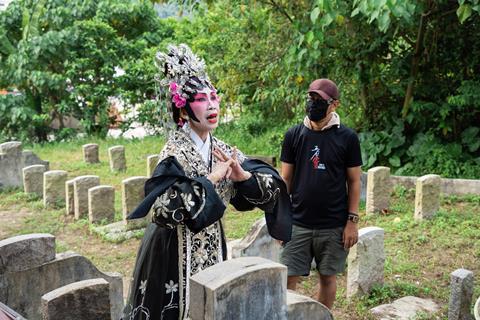
A local release was never on the cards for Malaysian director Chong Keat Aun’s Snow In Midsummer, but against all odds, it is now the first film directly about the tragic race riots that broke out in 1969 Kuala Lumpur to ever make it past Malaysian censors.
Set for release on July 18, the historical drama is about a Chinese family who become caught up in the violence that occurred on the night of May 13, 1969, which reportedly left hundreds of people dead. It then jumps to half a century later to focus on the encounter of two survivors at a mass grave of the riot victims. Despite having no violence depicted on screen, it is bold in directly addressing the riot and its aftermath.
“The May 13 incident is one of the two most sensitive subject matters for Malaysia – the other is communism,” says producer Wong Kew Soon of Kuala Lumpur-based Janji Pictures. “Our investors knew that the film wouldn’t stand a chance for a local release when they came on board. We didn’t apply for any production funding from FINAS [National Film Development Corporation Malaysia] for the same reason.”
Snow In Midsummer has earned accolades internationally, winning a Musa cinema and arts award special mention following its world premiere in Venice’s Giornate Degli Autori section and receiving nine nominations at Taiwan’s Golden Horse Awards. It was named best film in the young cinema competition (Chinese-language) at Hong Kong International Film Festival in April and is set for its North American premiere in competition at the New York Asian Film Festival on July 22.
While the filmmakers were focusing on the international campaign, the turning point came during the Singapore International Film Festival in December. Among the audience was a Malay couple who turned out to be FINAS deputy chairman Noor Azam bin Shairi and his wife.
Noor approached the filmmakers after the screening and urged them to submit the film to LPF (Lembaga Penapis Filem), the Film Censorship Board of Malaysia, and even offered to help them get Wajib Tayang, the two-week compulsory screenings for local films. “He believed the film should be shown in Malaysia. It was a big vote of confidence for us,” says Wong.
The film was submitted to LPF in January, hoping for a May release to match the Chinese film title, which translates to Snow In May. However, the censorship process was far from straight forward and the filmmakers prepared for the worst when they received a call for a meeting with LFP.
Strict censorship
The meeting had about 20 people present, including LPF chairman Mohamad Khir Mat Lazim, Jakim (the Islamic Affairs Department) and former representatives from the police force and the army. It went on for about two hours during which more than 20 questions were asked, including why director Chong made the film.

“That’s the first question and the most critical,” says Wong. “Chong patiently explained that he wanted to use a gentle approach to tell the story and care for the survivors, without pointing fingers at anyone. That’s the true intention of Chong who is a cultural conservationist dedicated to preserving history.”
This is not the first time that Chong has had a run-in with censors. His directorial feature debut The Story Of Southern Islet, based on his childhood experiences, won the best new director prize at the Golden Horse Awards in 2020. However, it had to mute some dialogue and cover some subtitles when screened as the closing film of the Malaysia International Film Festival in 2022, where it won the audience award.
Malaysia has a long history of strict censorship. Most recently, Malaysian director Amanda Nell Eu disowned the censored version of her Cannes-winning Tiger Stripes that was made for the local release in October, while Mentega Terbang, in which a Muslim teenage explores other faiths, was removed from a streaming platform after both local director Khairi Anwar and producer Tan Meng Kheng were reportedly charged with hurting religious feelings.
Homosexual themes are also a hot button, with recent Hollywood blockbusters Lightyear and Thor: Love And Thunder being banned for featuring LGBTQ+ elements. New censorship guidelines were introduced in May to further “maintain public order”.
After the LPF meeting, the filmmakers were asked to add Malay subtitle and make certain edits. After a few rounds of resubmissions over several months, Snow In Midsummer was finally passed in May with a an 18 rating. The Malaysian version is a couple of minutes shorter than the international version.
The filmmakers later came to know that an unidentified religious leader played a big part in clearing censorship when various review panels could not reach a decision. “He said that it was alright to show the film as more than 50 years have passed and they shouldn’t wait for another 50 or 100 years before doing so,” says Wong. “We’re grateful that the release of Snow In Midsummer is a first step in finding closure for the 513 incident. It’s an important milestone.”
Malaysian distributor Mega Films is releasing the film in 48 cinemas nationwide. The Malaysian premiere will take place on July 15 in Penang in northwest Malaysia where 60% of the film was shot.
The Malaysia-Singapore-Taiwan production is backed by SunStrong Entertainment, August Pictures, Swallow Wings Films, Southern Islet Pictures and Janji Pictures, along with funding support from Singapore’s Infocomm Media Development Authority (IMDA), Taiwan Creative Content Agency (TAICCA) and the Taipei Film Fund as well as filming incentives from Penang’s tourism board.
























No comments yet